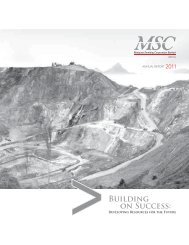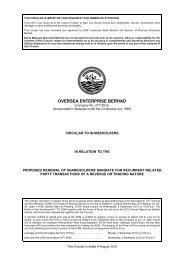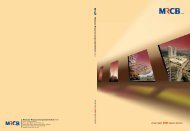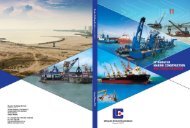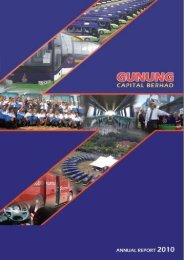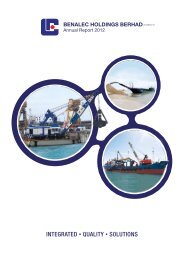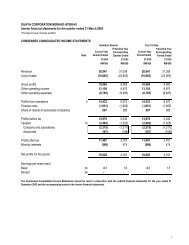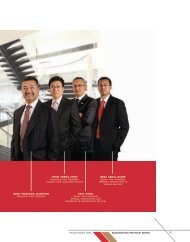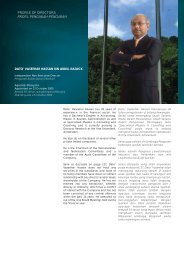UOBKH/AR09 [web] - ChartNexus
UOBKH/AR09 [web] - ChartNexus
UOBKH/AR09 [web] - ChartNexus
You also want an ePaper? Increase the reach of your titles
YUMPU automatically turns print PDFs into web optimized ePapers that Google loves.
10<br />
Economic Review & Outlook 2010 (continued)<br />
H O N G K O N G<br />
Review of 2009<br />
The Hong Kong economy rebounded from a contraction of 3.6%<br />
in the first quarter to a 2.6% growth in the last quarter of the<br />
year. Overall, Hong Kong’s GDP fell by 2.7% in 2009, the first<br />
annual recession since 1998, compared with 2.1% growth in 2008.<br />
Merchandise trade was the most heavily hit segment and dragged<br />
down the economy for most of the year. For the whole year, total<br />
exports of goods saw a huge 12.6% drop in real terms after<br />
growing 5% in 2008. Re-exports, the main driver of Hong Kong’s<br />
exports, shrank by 11.8% from 6% growth in 2008.<br />
Hong Kong’s labour market has been deeply depressed by the<br />
global financial crisis. However, the government’s policy of<br />
‘stabilising the financial sector, supporting enterprises and<br />
preserving employment’ has effectively provided a faster<br />
improvement than the market had expected. Eventually,<br />
unemployment rate fell to 4.9% in the fourth quarter after it<br />
peaked at 5.4% in the second quarter.<br />
Inflationary pressure in 2008 quickly turned into deflation in the<br />
middle of 2009. However, the extremely loose monetary<br />
environment finally lifted the CPI back to positive figure and hit<br />
1.3% of GDP growth in the last quarter. Consumption demand<br />
was held back because of falling income but the sector saw<br />
progressive improvement in the final quarter when retail sales<br />
rose 12.8%, after experiencing a recession for the rest of the year.<br />
The property market rebounded very strongly from the end of<br />
2008, surging 27% by the end of 2009.<br />
Outlook for 2010<br />
The lower unemployment rate, accelerated retail sales and better<br />
trading figures in 4Q09 indicated that the economic rebound will<br />
possibly continue in 1H10. Meanwhile, the recovery of external<br />
demand from both emerging and developed countries may also<br />
provide further support to GDP growth. Therefore, the GDP growth<br />
rate could be particularly strong in the first quarter, given the low<br />
base in 1Q09. However, inflationary pressure may possibly start<br />
building up from the beginning of the year. The rising global<br />
food and commodity prices may pose upside risks to the CPI.<br />
Local consumer and business sentiments are likely to be strong<br />
in 2010, given the expectation of an improvement in income.<br />
Inbound tourism is also seeing an increasing chance to move up,<br />
following the persistently growing number of visitors since last<br />
August, particularly from mainland China.<br />
Overall, the performance of the small and open economy of Hong<br />
Kong will largely depend on the fragile global recovery in 2010.<br />
With the rebound in global production and trade, Hong Kong<br />
could continue the momentum seen in late 2009.<br />
Stock Market Review for 2009<br />
The Hong Kong market recovered very quickly from the downturn<br />
triggered by the global financial crisis. The Hang Seng Index<br />
(HSI) reached a high of 23,099 in mid-November before hitting<br />
bottom at 11,345 in early March. The HSI closed at 21,872, 52%<br />
higher than the end of 2008. Total market capitalisation was<br />
HK$17,874.3b at the end of 2009, 74% higher. In 2009, a total of<br />
73 companies were newly listed on the Main Board and GEM,<br />
raising HK$248.2b, the largest among all stock exchanges in the<br />
world. Total equity funds raised was HK$642.1b in 2009.<br />
In 2009, more actions were also taken by regulators to strengthen<br />
market regulation and protect investors after the severe financial<br />
crisis in 2008. The measures actually restored investor confidence<br />
as well as improved market transparency. Meanwhile, the signing<br />
of agreements between the Hong Kong Stock Exchange and<br />
Shanghai and Shenzhen Stock Exchanges may signal further cooperations<br />
between mainland China and Hong Kong. The<br />
exchanges would work more closely together to facilitate the fundraising<br />
activities of Chinese enterprises.<br />
Stock Market Outlook for 2010<br />
A massive volume of capital has flowed into the Hong Kong<br />
market, creating an extraordinary easy monetary environment.<br />
The rally in property and stock markets in 2009 was partially the<br />
consequence of the massive capital inflows. If the inflows<br />
eventually correct, the Hong Kong market may easily be distorted,<br />
being a small and open economy. However, on the back of the<br />
gradual global recovery, especially the development of China’s<br />
economy, we believe Hong Kong’s economic growth may be<br />
sustainable. We look forward to a further rebound in 2010.<br />
We believe the next growth momentum is likely to be the real<br />
recovery of the external sector, when countries step out of the<br />
recession. The boom experienced in the sector may significantly<br />
improve the employment figure and will in turn provide a strong<br />
income effect. We believe property (including commercial<br />
properties), local retail and industrial sectors will be the prime<br />
beneficiaries of this recovery. Once again, we believe Hong Konglisted<br />
China stocks should perform well, given the better-thanexpected<br />
fundamentals in mainland China.<br />
I N D O N E S I A<br />
Review of 2009<br />
Amid the global financial crisis, Indonesia’s GDP grew 4.5% in<br />
2009 on the back of a domestically-driven economy. Inflation was<br />
also low at 2.78% and hence, Bank Indonesia (BI) could cut the<br />
BI rate by 300bp to 6.5% from 9.5% at end-08. As a result,<br />
consumer confidence recovered to above 100 in April, which<br />
drove the recovery in cement and automotive sales.<br />
Despite the strong recovery in purchasing power, the proportion<br />
of private consumption declined to 58.6% from above 60% in<br />
the previous years on the back of gross fixed capital formation<br />
growing 4.2%, as the result of improved political stability with<br />
the peaceful parliamentary and presidential elections.


![UOBKH/AR09 [web] - ChartNexus](https://img.yumpu.com/18127887/12/500x640/uobkh-ar09-web-chartnexus.jpg)
